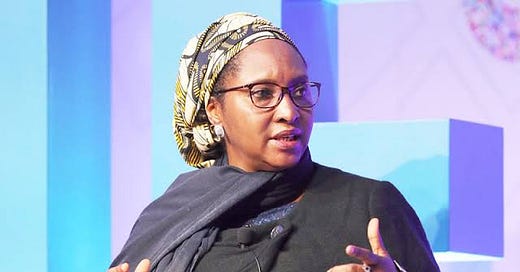FG to use Eurobond cash and loans to fund petrol subsidy, says Finance Minister, Zainab Ahmed
Zainab Ahmed: Petrol subsidy costs N150bn monthly
The federal government says it will use $2.2 billion of the fund raised via Eurobond to cater for petrol under-recovery costs. The rising costs of oil in the international market due to the Russia-Ukraine war has placed a greater burden on the government since petroleum products are imported.
Nigeria continues to import petroleum products because the government has failed to fix the three main refineries.
The government said it would also target more local borrowing in 2022 to fund subsidy payments.
In September 2021, Nigeria raised $4 billion through Eurobond issuance.
Subsidy or under-recovery is the underpriced sales of premium motor spirit (PMS), better known as petrol. Already the sum of 150 billion Naira is spent monthly on petrol subsidy costs, which the government maintains is no longer sustainable. The government has been under pressure from the International Monetary fund (IMF) and the World Bank to remove petrol subsidy.
The government had planned to stop subsidy payments on petroleum products from July this year — but reversed its decision in January, extending it by 18 months instead. The Nigeria Labour Congress (NLC) had planned a showdown and nationwide demonstration over the planned removal of subsidy. Fears of the potential consequences from a fallout of public demonstration made the government backdown.
Zainab Ahmed, minister of finance, budget, national planning, disclosed this while speaking with Reuters on the sidelines of an Arab-African conference in Cairo.
Ahmed said Nigeria would not tap the Eurobond market this year.
“Rising oil prices have put us in a very precarious position … because we import refined products … and it means that our subsidy cost is increasing,” she said.
The minister said that the government was working with lawmakers to boost revenues and that the rise in oil prices means that borrowings will increase more than planned.
Oil prices have been on the rise following Russia’s invasion of Ukraine.
This has raised petroleum landing cost, thus widening market price and actual cost per litre.
For Nigeria, high oil prices mean high subsidy payments for the government to sell petrol below the international market rate.
The country depends almost entirely on imports to meet its domestic gasoline needs, even though it is a crude oil exporter. It is also facing shortages after recently importing off-spec petrol.
It budgeted about N3 trillion for petrol subsidy in 2022.
EXCLUSIVE: Petrol subsidy gulps N210bn as NNPC records ZERO remittance to FAAC
The Nigerian National Petroleum Company (NNPC) Limited says it expended N210.38 billion on petrol subsidy in January 2022.
Subsidy or under-recovery is the underpriced sales of premium motor spirit (PMS), better known as petrol.
NNPC said this in its monthly presentation to the Federation Account Allocation Committee (FAAC) meeting concluded on Thursday, February 24.
Last month, NNPC deducted N270 billion for December’s 2021 under-recovery, amounting to N1.43 trillion in the year. This action depleted revenue accrued to the federation account to N542 billion from a projected N2.51 trillion.
According to the latest document, obtained by The Cable, the shortfall included a December 2021 value of PMS shortfall of N176.48 billion plus the outstanding value shortfall recovery of N33.90 billion accrued over 2021.
The oil firm said it would deduct N242.5 billion (about N143.7 billion for January 2022 recovery and November spot arrears of N98.8 billion) during next month’s FAAC meeting.
Further checks showed that NNPC did not remit any money to the FAAC for onward distribution to the federating units –- an action that may lead to state governments’ inability to pay salaries.
It, however, recorded N383 billion as gross revenue from crude oil sales in January, a dip from the projected N414.9 billion.
The Cable understands that with the addition of N61.74 billion from tax, the federation would share a meagre N444 billion — down from N593 billion shared last month.
Most states are presently experiencing fiscal stress and kicking against deductions of the shortfall from FAAC remittances.
An ad-hoc committee of the National Economic Council (NEC) had recommended gradual deregulation of PMS prices by February 2022 to reduce the pressure of revenue accrued to states.
In 2022, the federal government may spend up to N3 trillion to settle the PMS shortfall.
Last week, President Muhammadu Buhari asked the national assembly to approve the N2.557 trillion budget for petrol subsidy in 2022.
The allocation was not catered for in the signed 2022 budget due to the deregulation policy of the Petroleum Industry Act.
With the new provision, the government had also proposed an 18-month extension for the implementation of the petroleum law.
Courtesy The Cable with additional reporting by Metro



